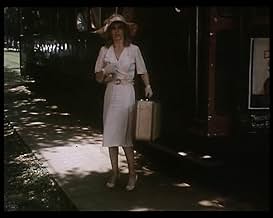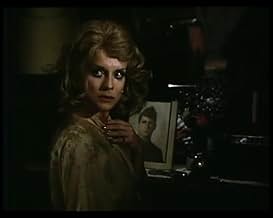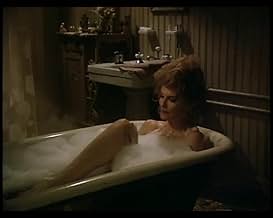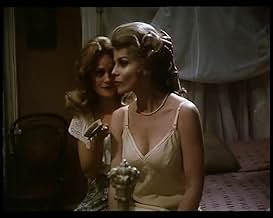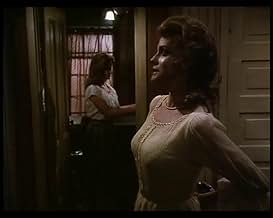Agrega una trama en tu idiomaBlanche Dubois goes to visit her pregnant sister and husband Stanley in New Orleans. Stanley doesn't like her, and starts pushing her for information on some property he knows was left to th... Leer todoBlanche Dubois goes to visit her pregnant sister and husband Stanley in New Orleans. Stanley doesn't like her, and starts pushing her for information on some property he knows was left to the sisters. He discovers she has mortgaged the place and spent all the money, and wants to ... Leer todoBlanche Dubois goes to visit her pregnant sister and husband Stanley in New Orleans. Stanley doesn't like her, and starts pushing her for information on some property he knows was left to the sisters. He discovers she has mortgaged the place and spent all the money, and wants to find out all he can about her. Even more friction develops between the two while they are ... Leer todo
- Dirección
- Guionistas
- Elenco
- Ganó 4 premios Primetime Emmy
- 6 premios ganados y 9 nominaciones en total
- Dirección
- Guionistas
- Todo el elenco y el equipo
- Producción, taquilla y más en IMDbPro
Opiniones destacadas
Not only is this take on the material more faithful to the original play (by the time the 80's rolled around, you could get away with more on TV than you could get away with on screen in the 50's), but it features a wonderful performance by Ann-Margret as Blanche DuBois. At first, Margret's interpretation of the character is a bit jarring. She's far from the nervous, shrinking violet we're so used to seeing. She has more strength than most other Blanches I've seen, but as the story progresses, one starts to see how this is simply a mask she wears to hide her fear and vulnerability. It's a wonderfully fresh interpretation of the role.
Beverly D'Angelo and Randy Quaid are equally excellent as Stella and Mitch. Treat Williams can't quite seem to escape the shadow of Marlon Brando, but he looks the part and is appropriately brutish as Stanley. Broadway vet Marvin Hamlish's music score is gorgeous and sexy.
Of the versions of 'A Streetcar Named Desire', the best known one is the 1951 film with Marlon Brando and Vivien Leigh, although not a faithful adaptation as such and toned down in comparison on its own it still sizzles with passion, is incredibly well made and has two iconic lead performances. Other versions include the 1995 Jessica Lange version, which is more faithful and well performed, if not on the same level, but didn't have quite the same amount of passion and emotional impact. There is also this one from 1984, this time with Ann Margaret and Treat Williams, and would say the same general overview here as the Lange version overall though there is actually more of it. Also recommend highly the National Theatre Live production from 2014 with Gillian Anderson, and while it is more appreciate than love in quality the opera by Andre Previn may spark some interest too.
For me, this version on its own is not as good as the film, though did have enormous shoes to fill. It is though better than the Lange version, this having the better Stanley and Blanche and Stella's reactions to Stanley's rape are far more believable here, actually felt the hurt and anger. Its fidelity is admirable, with what was left out, repressed or just implied intact, and it's not a case of being faithful not being too much. Some may say it's pointless, do have to disagree and say it stands very well on its own without comparison and does deserve to exist, regardless of how it compares.
Not an awful lot wrong here in this 'A Streetcar Named Desire'. Maybe the tension, or at least the chemistry between Blanche and Stanley, doesn't sizzle as much as in the film, though there is more of it than in Lange's version.
Did admire that Treat Williams treated Brando's Stanley with respect and captures the animalistic brutishness very great intensity, it is a very good performance that could have been excellent. Perhaps though he could have brought out more of his own touches and have a slighter fresher interpretation, at times it did feel slightly too closely indebted to Brando though not quite an imitation. Although Alec Baldwin won't be for all tastes, his more human approach to Stanley was somewhat interesting.
'A Streetcar Named Desire' does look good though, both suitably elegant and claustrophobic. The photography is more than sufficient though could have been more expansive. The music captures the time period and setting very authentically. The production is thoughtfully directed and never tasteless, and Williams' dialogue has full impact here. The ending is intact and it is very powerful here.
While the performances may not be iconic level, they are still very good. Ann-Margaret is a more subtle but still searing Blanche, her vulnerability quite affecting to see. Beverly D'Angelo portrays conflicted Stella with very poignant pathos while giving some steel too. Randy Quaid's sensitive Mitch is no less inferior, loved how he portrayed his loyalty and also his later anger at his treatment by Blanche.
In summary, very well done and deserves to stand on its own two feet. 8/10
Initially, as with many new versions of famous plays, the differences glared out at me: at times, the dialogue tends to be spoken a bit too rapidly; more memorized than natural. And at first, Ann-Margret's sex appeal and confidence is a bit startling compared to the butterfly-like fragility we're used to from Vivien Leigh's iconic turn as Blanche.
But here, A-M makes the character her own. Beverly D'Angelo is fine as sister Stella too, in spite of the variance in height between the two actresses. As this 'Streetcar' rolls on, there are more good moments. Randy Quaid's Mitch plays well with the neurotic Blanche; their scenes are touching and realistic. It would be nice to see them go off into the sunset at the end---of course, Tennessee Williams had other plans---and the climactic confrontation between Stanley and Blanche is every bit as unsettling as it was written to be. All in all, worth a watch---and when Ann-Margret is involved, it's never a waste of time. (Yes, I'm biased. Now see the movie.)
¿Sabías que…?
- TriviaTennessee Williams wanted Meryl Streep for a film version of "A Streetcar Named Desire" in the 1980s. When Streep proved unavailable, the project was refashioned for television and the role of Blanche given to Ann-Margret.
- Citas
Blanche DuBois: I have always depended on the kindness of strangers.
- ConexionesEdited into Ann-Margret: Från Valsjöbyn till Hollywood (2014)
- Bandas sonorasTil the Blues Get Gone
Written by Marvin Hamlisch and Dean Pitchford

